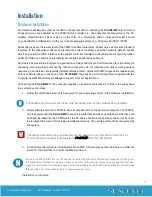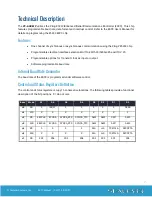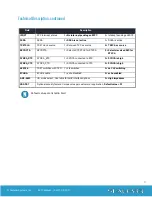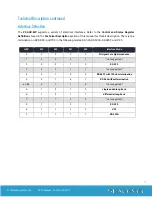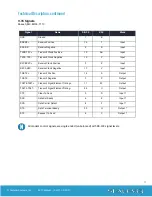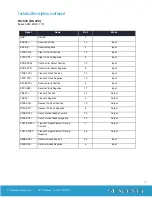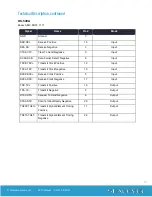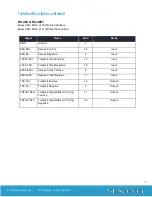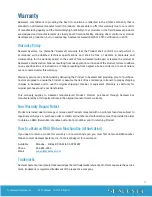
19
© Sealevel Systems, Inc.
3612 Manual | SL9115 9/2021
Appendix C - Electrical Interface, continued
RS-485
RS-485 is backwardly compatible with RS-422; however, it is optimized for party line or multi-drop
applications. The output of the RS-422/485 driver is capable of being
Active
(enabled) or
Tri-State
(disabled). This capability allows multiple ports to be connected in a multi-drop bus and selectively polled.
RS-485 allows cable lengths up to 4000 feet and data rates up to 10 Megabits per second. The signal levels
for RS-485 are the same as those defined by RS-422. RS-485 has electrical characteristics that allow for 32
drivers and 32 receivers to be connected to one line. This interface is ideal for multi-drop or network
environments. RS-485 tri-state driver (not dual-state) will allow the electrical presence of the driver to be
removed from the line. Only one driver may be active at a time and the other driver(s) must be tri-stated.
RS-485 can be cabled in two ways, two wire and four wire mode. Two-wire mode does not allow for full
duplex communication and requires that data be transferred in only one direction at a time. For half-duplex
operation, the two transmit pins should be connected to the two receive pins (Tx+ to Rx+ and Tx- to Rx-).
Four wire mode allows full duplex data transfers. RS-485 does not define a connector pin-out or a set of
modem control signals. RS-485 does not define a physical connector.
RS-530 / 530A
RS-530 (a.k.a. EIA-530) compatibility means that RS-422 signal levels are met, and the pin-out for the DB-
25 connector is specified. The EIA (Electronic Industry Association) created the RS-530 specification to
detail the pin-out and define a full set of modem control signals that can be used for regulating flow control
and line status. The major difference between RS-530 and RS-530A lies in the modem control interface
signals. In RS-530 all signals are differential, in RS-530A signals DTR, DSR, DCD are single ended. The RS-
530 specification defines two types of interface circuits, Data Terminal Equipment (DTE) and Data Circuit-
Terminating Equipment (DCE). The Sealevel Systems adapter is a DTE interface.
V.35
V.35 is a standard defined by ITU (formerly CCITT) that specifies an electrical, mechanical, and physical
interface that is used extensively by high-speed digital carriers such as AT&T Dataphone Digital Service
(DDS). ITU V.35 is an international standard that is often referred to as
Data Transmission at 48 Kbps Using
60 - 108 KHz Group-Band Circuits.
ITU V.35 electrical characteristics are a combination of unbalanced
voltage and balanced current mode signals. Data and clock signals are balanced current mode circuits.
These circuits typically have voltage levels from 0.5 Volts to -0.5 Volts (1 Volt differential). The modem
control signals are unbalanced signals and are compatible with RS-232. The physical connector is a 34-pin
connector that supports 24 data, clock, and control signals. The physical connector is defined in the ISO-
2593 standard. ITU V.35 specification defines two types of interface circuits, Data Terminal Equipment
(DTE) and Data Circuit-Terminating Equipment (DCE). The Sealevel Systems adapter is a DTE interface.

